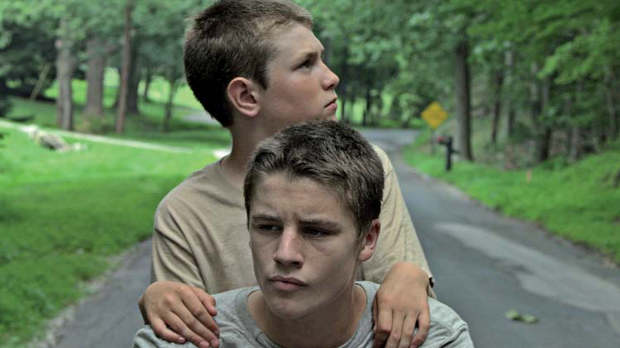"I wanted to tell a story that treated children like real people" - Filmmaker Daniel Patrick Carbone on HIDE YOUR SMILING FACES

Daniel Patrick Carbone's debut feature tells a very vivid story of childhood. It particularly focuses on the loss of innocence experienced by two brothers, the central figures in Hide Your Smiling faces, who are thur forced to confront the mystery of nature and their own mortality after discovering the dead body of a friend of theirs in the woods.
MATT MICUCCI: DO YOU CONSIDER HIDE YOUR SMILING FACES A COMING OF AGE DRAMA?
DANIEL PATRICK CARBONE: I think the term coming of age is interesting because people are growing and becoming different people over the course of a film. The idea for me was to tell the type of story that would have been made by some of my favourite directors in their first features, that involved children and were influenced by their childhood. Such as Ratcatcher by Lynne Ramsey and David Gordon Green's George Washington. Even Tarkovsky's film was about a child.
MM: DEPICTIONS OF CHILDHOOD ARE ALWAYS TRICKY IN CINEMA, BUT YOUR FILM IS QUITE DIFFERENT.
DPC: I wanted to tell a story that treated children like real people. A lot of films about kids are too eloquent or too world knowledgeble already. And it's not really like that, it's kind of scary and wonderful confusing at that age. But, yes, absolutely. I wanted the film to also be hypnotic. I think a good film should always be able to hypnotise its audience. I wanted to use a certain visual style and a certain soundscape to let the viewers put themselves in their own film and make them think about their own childhood. It sounds weird, but I hope that while people watch my film they also think about other things and be reminded of their own experiences as well as what moments that at the time seemed very insignificant to them were actually important.
 MM: SO YOU WANTED YOUR FILM TO BE AN INTERACTIVE EXPERIENCE.
MM: SO YOU WANTED YOUR FILM TO BE AN INTERACTIVE EXPERIENCE.
DPC: I chose to purposely keep the story ambiguous and avoided telling them what to feel. It was more like showing them a series of formative moments and leave it to the audience to fill in those gaps. Also, with the ending I wanted the audience to leave and argue whether they would have done the same things that the characters do or not. So, in that sense Hide Your Smiling Faces is more about asking questions than answering question.
MM: THE LANDSCAPE PLAYS AN IMPORTANT ROLE IN THE FILM TOO.
DPC: I wanted the landscape to stand in as something the characters could escape to, but also not a comforting place. So, I wanted to use similar locations that sometimes felt imposing, overwhelming while on other times they felt like slices of Eden. To me, nature has so much mystery in it. It can be wonderful but also a very scary place. So, the landscape actually ends up reflecting the way the characters feel.
MM: HOW DID YOU GET SUCH GREAT PERFORMANCES BY THE YOUNG CAST?
DPC: The best thing is always to find the right actors, and Ryan [Jones] and Nathan [Varnson] immediately stood out to us as the two kids that needed to play these roles. The audition process was less reading lines and much more just like a long conversation and improvisation. There was a lot of improvisation in the film - I mean, there were lines written down but I didn't necessarily want the actors to repeat them because no adult can truly write children's dialogue as well as a child can deliver it. There were outlines drawn up, but they had as much freedom as they wanted. And it wasn't just with dialogue, but also with movements - there were no strict marks for them to follow.
The film was shown at the BFI London Film Festival last year, where this interview was conducted, and it's out in the UK in selected cinemas right now.